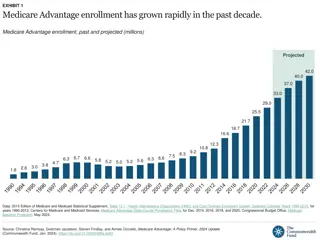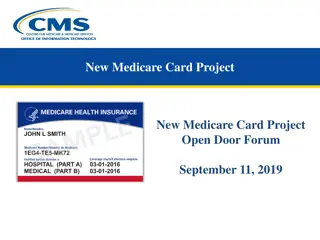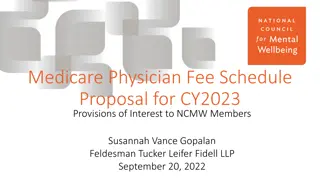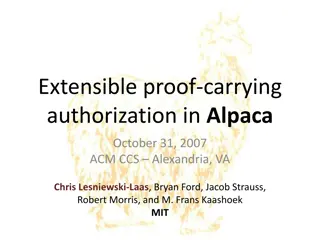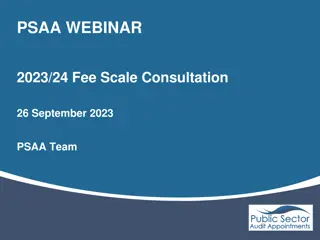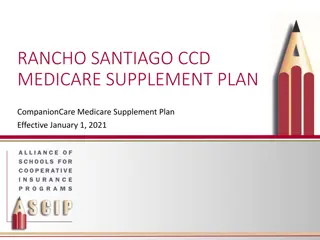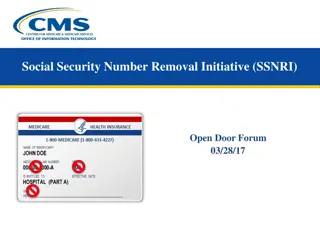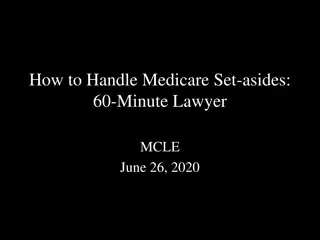Insights on 2023 Medicare Fee Schedule & APTA Indiana Prior Authorization Advocacy
Review key updates from the 2023 Finalized Medicare Physician Fee Schedule impacting outpatient PT practice. Understand APTA Indiana's efforts in prior authorization advocacy and learn about tools for member participation. Explore the Payer Reporting Portal and know the process for appealing denied visits. Details on conversion factor cuts, therapy threshold changes, and clarification on supervision requirements are provided. Additionally, learn about Remote Therapeutic Monitoring codes and telehealth reimbursement updates under the schedule.
Download Presentation

Please find below an Image/Link to download the presentation.
The content on the website is provided AS IS for your information and personal use only. It may not be sold, licensed, or shared on other websites without obtaining consent from the author. Download presentation by click this link. If you encounter any issues during the download, it is possible that the publisher has removed the file from their server.
E N D
Presentation Transcript
What to Know About the Finalized 2023 Medicare Physician Fee Schedule and APTA Indiana Prior Authorization Payer Reporting Portal and Advocacy Andrea Lausch, PT, DPT Practice and Payment Specialist APTA Indiana
Review 2023 Finalized Medicare Physician Fee Schedule updates relevant to outpatient PT practice. Educate members on APTA Indiana prior authorization advocacy efforts related to prior authorization. Inform APTA Indiana members of tools and resources to participate in prior authorization advocacy. Review the Payer Reporting Portal with members Educate members on completing an appeal when denied additional visits Objectives
The conversion factor is set to approximately $33.06, a 4.46% cut from 2022. 2023 Finalized Medicare Physician Fee Schedule Update Therapy Threshold will increase $2230. Use a KX modifier when Medicare beneficiaries PT/SLP services are greater than $2,230 for payment. Targeted medical review threshold will remain at $3000. This does not guarantee a review but increases its likelihood. It is set to remain unchanged through 2028. General Supervision is clarified for Remote Therapeutic Monitoring (RTM) supervision for rehab agencies, comprehensive outpatient rehab facilities, and other institutional providers. APTA is has requested clarification for supervision requirements for private practices.
98975- initial set-up and patient education on use of equipment. 98076: RTM device(s) supply with scheduled recording(s) and/or programmed alert(s) transmission to monitor respiratory system, each 30 days. 98977 RTM device supply with scheduled recording(s) and/or programmed alert(s) transmission to monitor musculoskeletal system, each 30 days. 98980 Remote therapeutic monitoring treatment management, physician/other qualified health care professional time in a calendar month requiring at least one interactive communication with the patient/caregiver during the calendar month; first 20 minutes. 98981 Remote therapeutic monitoring treatment management, physician/other qualified health care professional time in a calendar month; each additional 20 minutes. Remote Therapeutic Monitoring Codes For codes 98980/98981 interactive communication is possible via a phone call, telehealth, video call or in person. There must be live communication. Documentation must support medical necessity and follow Medicare guidelines as outlined in the Medicare Manual: MBPM Chapter 15, Sec. 230.5 Billing for the service in person must be a separate event than the patient s other in person care.
2023 Finalized Medicare Physician Fee Schedule Update Telehealth: CMS will reimburse for therapy services for 151 days after the end of the public health emergency (PHE) due to COVID-19. Currently the PHE is set to end 1/11/23. As it stands currently, reimbursement for outpatient therapy services delivered via telehealth will end 6/11/23. CMS will continue to permit direct supervision of a PTA in a private practice setting through virtual presence by a PT through the end of the calendar year the PHE ends. As this stands now, this flexibility will end at the end of the calendar year 2023. At that point, unless there is a change in status, PTA supervision will revert to direct supervision in which the PT must be in the office when a PTA is treating a Medicare beneficiary.
Medicare Physician Fee Schedule H.R 8800 Supporting Medicare Provider Act Telehealth Advocacy Expanded Telehealth Access Act of 2021 (H.R.2168/S.3193) Would permanently at PTs to CMS TH list. Telehealth Beyond COVID-19 (H.R. 4040) Passed in House, awaiting bill for vote in Senate. Extends current TH waiver for PTs/PTAs until 12/31/24. The Medicare Payment Differential on Services provided by PTAs H.R. 5536 Stabilizing Medicare Access to Rehabilitation and Therapy Act Administrative Burden Advocacy Prior Authorization H.R 3173/S.2018 Improving Seniors Timely Access to Care Act (passed in the House, currently awaiting vote in the Senate). https://www.apta.org/advocacy/issues https://www.apta.org/advocacy/take-action Current Federal APTA Practice and Payment Advocacy Efforts
Why the need for payer prior authorization advocacy? 2022 APTA Indiana Payment survey assessed the state of current payer prior authorization (PA) processes and their impact on providers and the patients they serve. The survey found current payer PA processes: Increase administrative burden and cost to practices; Delay access to PT by >3-5 days; can be delayed for weeks or a month if appealing a denial; Deny patients from completing their PT plans of cares- medically necessary and reasonable care; Requires frequent PA submissions and reassessments Are a widespread issue among many payers.
APTA Indiana Next Steps Joined a coalition of provider groups lead by the Indiana Hospital Association (IHA) working to introduce prior authorization legislation for 2023. APTA Indiana member testified at the Financial Institutions and Insurance Study Committee at the state house 10/3/22 along with IHA, American Medical Association, ISHA, and chiropractor. Senator Liz Brown will be introducing PA legislation in 2023. Developed a Payer Reporting Portal for providers to report issues in real-time to the association. Payer advocacy Developing a coalition with IOTA and ISHA to work with Medicaid on improving issues related to prior authorizations and therapy services. APTA Indiana Advocacy efforts
APTA and APTA Indiana needs your help How can you help? Encourage patients and PTs/PTAs to write their legislator, Medicaid, Medicare, and/or the Insurance Commissioner to inform these stakeholders how current PA processes are impacting their care. See APTA Indiana Practice and Payment page for templates and contact information. Save links and documents to a designated computers patients can access in the clinic when an issues arises. Use the Payer Reporting Portal when payment related issues surface Share with coworkers and management Provide in the free text box a clear explanation of the negative patient impact. Call to Action
File an appeal when additional visits are denied or insufficient visits are provided if documentation clearly shows necessity. Consider skipping the peer-to-peer review. It often takes 3 appeals before you get to an external appeal. Usually external reviews are approved, and the payer must comply. Payer must pay for external reviews. Appeals are tracked whereas peer to peers are not. Often the peer-to-peer reviewer has little power to approve more than a few visits 1-2 times. Call to Action




